Conservative vs. Liberal Nationalism
VerifiedAdded on 2020/03/28
|5
|1057
|32
AI Summary
This assignment examines the different perspectives on nationalism, focusing on conservative and liberal approaches. It analyzes the core principles of each ideology, drawing upon examples like Pauline Hanson's conservative views and Doug Cameron's liberal stance to illustrate their contrasting positions. The paper ultimately explores how these differing nationalisms shape political discourse and policies.
Contribute Materials
Your contribution can guide someone’s learning journey. Share your
documents today.
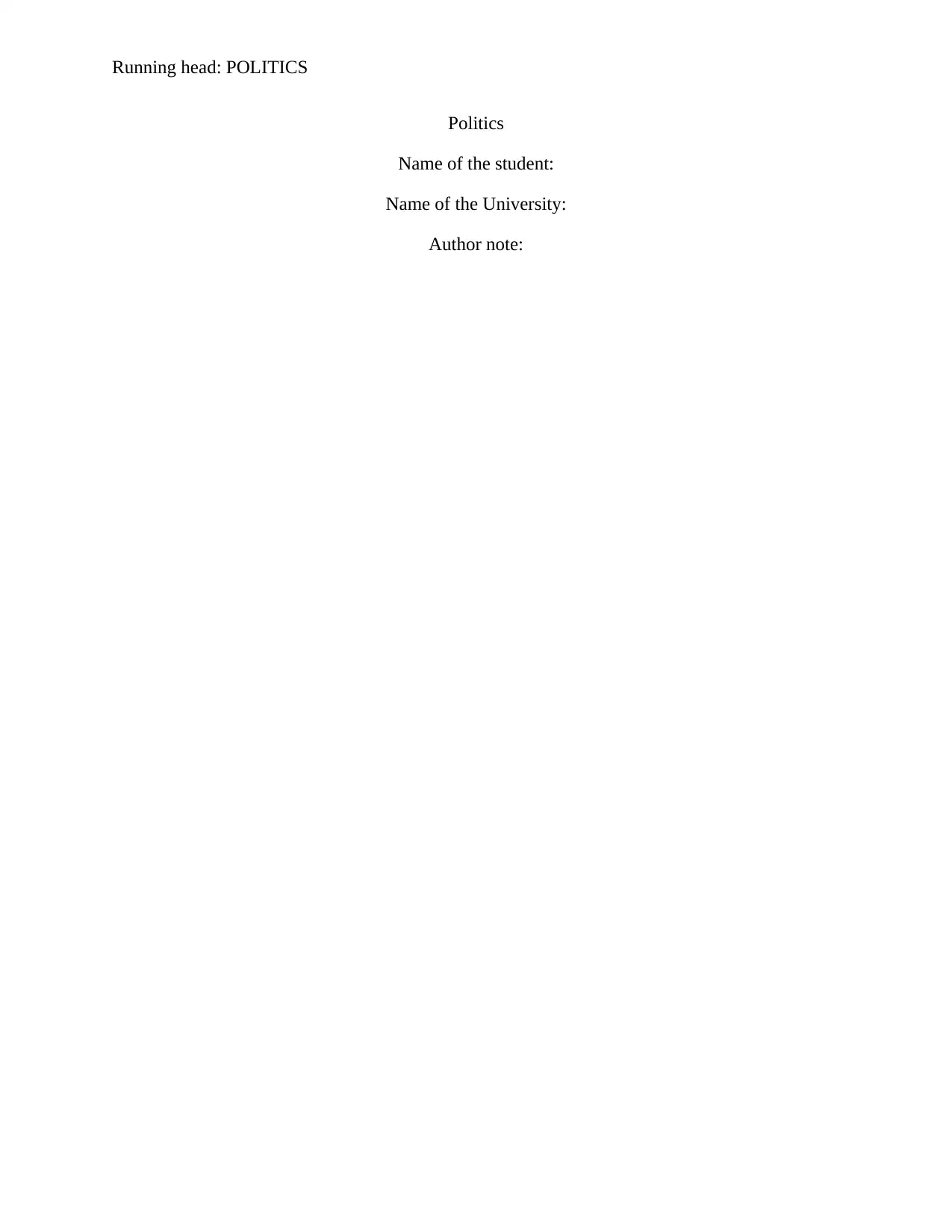
Running head: POLITICS
Politics
Name of the student:
Name of the University:
Author note:
Politics
Name of the student:
Name of the University:
Author note:
Secure Best Marks with AI Grader
Need help grading? Try our AI Grader for instant feedback on your assignments.
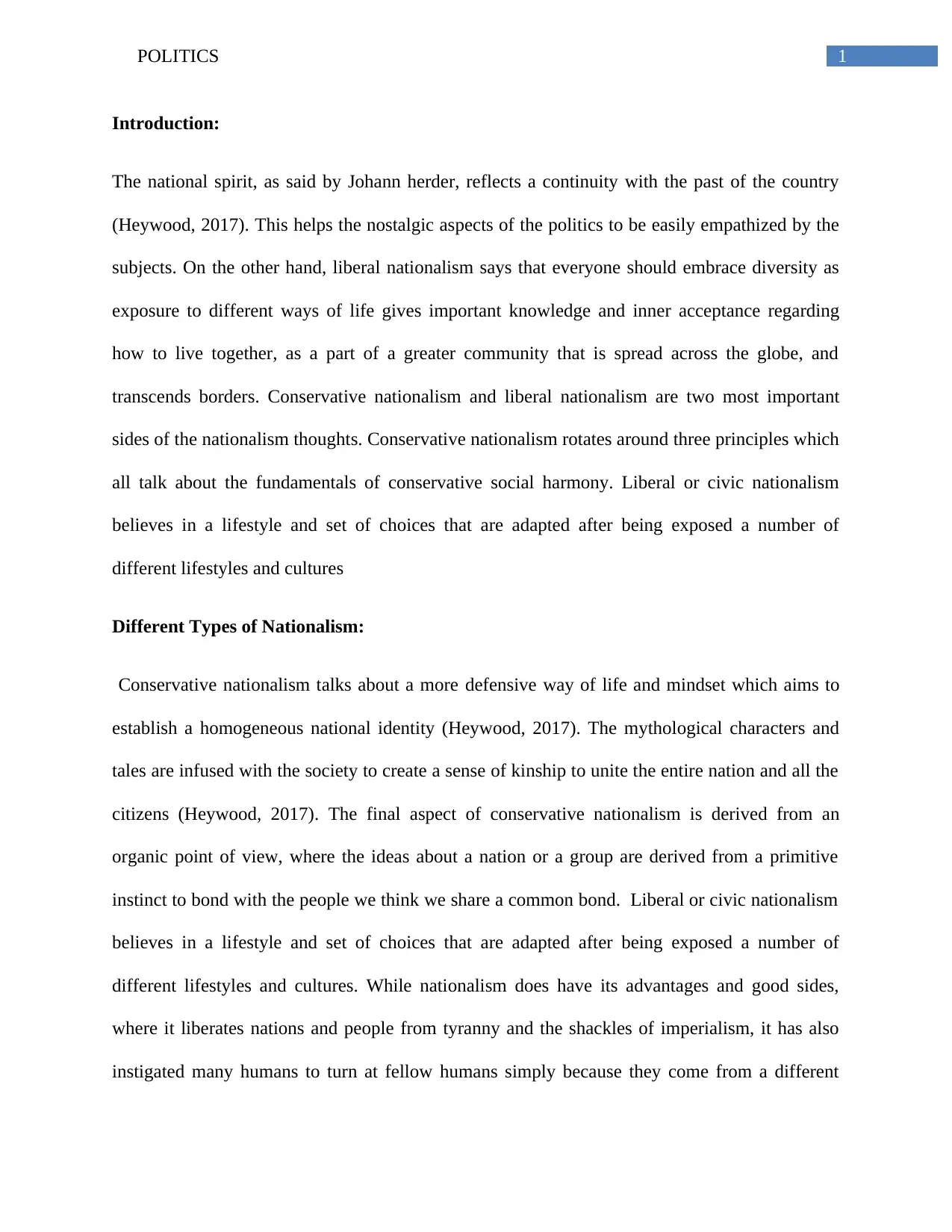
1POLITICS
Introduction:
The national spirit, as said by Johann herder, reflects a continuity with the past of the country
(Heywood, 2017). This helps the nostalgic aspects of the politics to be easily empathized by the
subjects. On the other hand, liberal nationalism says that everyone should embrace diversity as
exposure to different ways of life gives important knowledge and inner acceptance regarding
how to live together, as a part of a greater community that is spread across the globe, and
transcends borders. Conservative nationalism and liberal nationalism are two most important
sides of the nationalism thoughts. Conservative nationalism rotates around three principles which
all talk about the fundamentals of conservative social harmony. Liberal or civic nationalism
believes in a lifestyle and set of choices that are adapted after being exposed a number of
different lifestyles and cultures
Different Types of Nationalism:
Conservative nationalism talks about a more defensive way of life and mindset which aims to
establish a homogeneous national identity (Heywood, 2017). The mythological characters and
tales are infused with the society to create a sense of kinship to unite the entire nation and all the
citizens (Heywood, 2017). The final aspect of conservative nationalism is derived from an
organic point of view, where the ideas about a nation or a group are derived from a primitive
instinct to bond with the people we think we share a common bond. Liberal or civic nationalism
believes in a lifestyle and set of choices that are adapted after being exposed a number of
different lifestyles and cultures. While nationalism does have its advantages and good sides,
where it liberates nations and people from tyranny and the shackles of imperialism, it has also
instigated many humans to turn at fellow humans simply because they come from a different
Introduction:
The national spirit, as said by Johann herder, reflects a continuity with the past of the country
(Heywood, 2017). This helps the nostalgic aspects of the politics to be easily empathized by the
subjects. On the other hand, liberal nationalism says that everyone should embrace diversity as
exposure to different ways of life gives important knowledge and inner acceptance regarding
how to live together, as a part of a greater community that is spread across the globe, and
transcends borders. Conservative nationalism and liberal nationalism are two most important
sides of the nationalism thoughts. Conservative nationalism rotates around three principles which
all talk about the fundamentals of conservative social harmony. Liberal or civic nationalism
believes in a lifestyle and set of choices that are adapted after being exposed a number of
different lifestyles and cultures
Different Types of Nationalism:
Conservative nationalism talks about a more defensive way of life and mindset which aims to
establish a homogeneous national identity (Heywood, 2017). The mythological characters and
tales are infused with the society to create a sense of kinship to unite the entire nation and all the
citizens (Heywood, 2017). The final aspect of conservative nationalism is derived from an
organic point of view, where the ideas about a nation or a group are derived from a primitive
instinct to bond with the people we think we share a common bond. Liberal or civic nationalism
believes in a lifestyle and set of choices that are adapted after being exposed a number of
different lifestyles and cultures. While nationalism does have its advantages and good sides,
where it liberates nations and people from tyranny and the shackles of imperialism, it has also
instigated many humans to turn at fellow humans simply because they come from a different
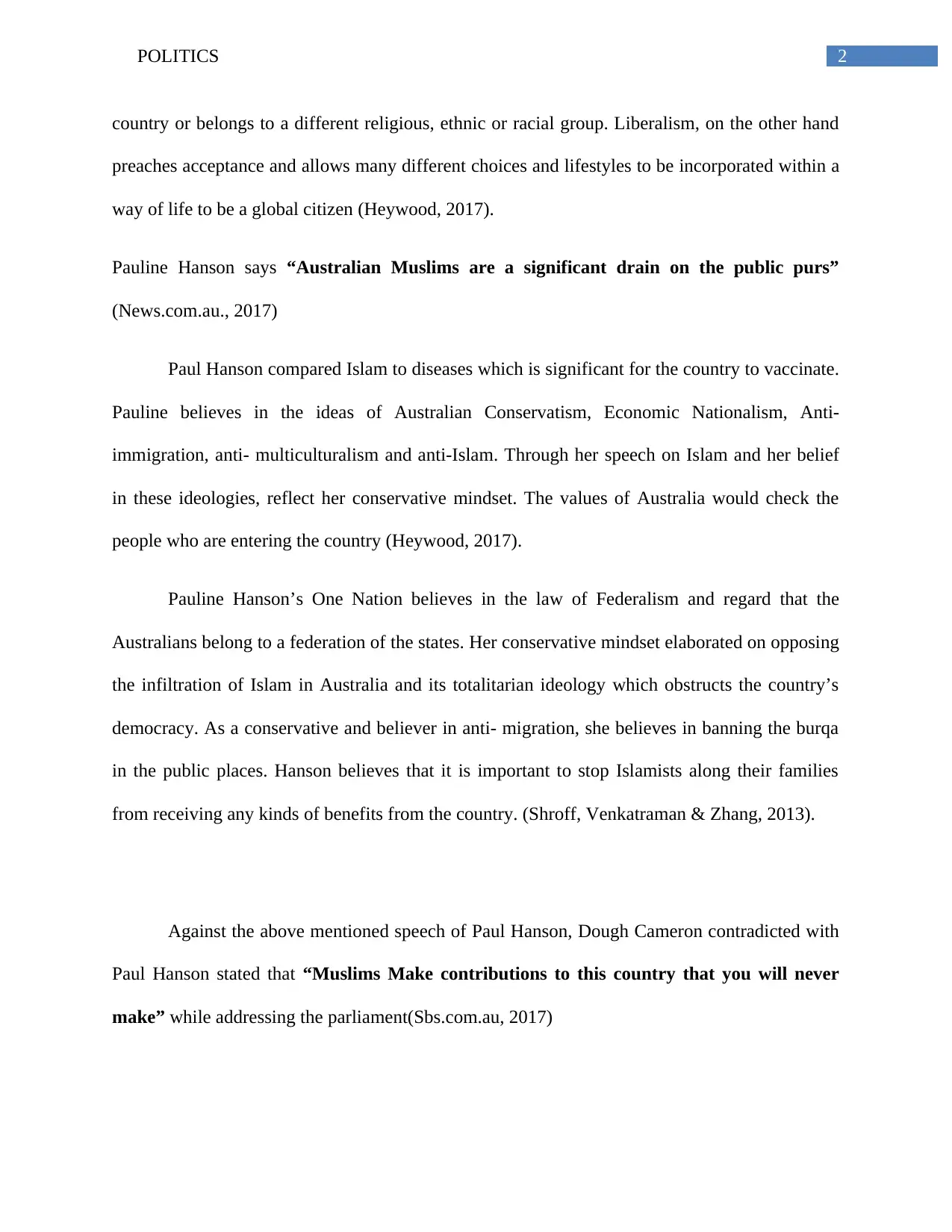
2POLITICS
country or belongs to a different religious, ethnic or racial group. Liberalism, on the other hand
preaches acceptance and allows many different choices and lifestyles to be incorporated within a
way of life to be a global citizen (Heywood, 2017).
Pauline Hanson says “Australian Muslims are a significant drain on the public purs”
(News.com.au., 2017)
Paul Hanson compared Islam to diseases which is significant for the country to vaccinate.
Pauline believes in the ideas of Australian Conservatism, Economic Nationalism, Anti-
immigration, anti- multiculturalism and anti-Islam. Through her speech on Islam and her belief
in these ideologies, reflect her conservative mindset. The values of Australia would check the
people who are entering the country (Heywood, 2017).
Pauline Hanson’s One Nation believes in the law of Federalism and regard that the
Australians belong to a federation of the states. Her conservative mindset elaborated on opposing
the infiltration of Islam in Australia and its totalitarian ideology which obstructs the country’s
democracy. As a conservative and believer in anti- migration, she believes in banning the burqa
in the public places. Hanson believes that it is important to stop Islamists along their families
from receiving any kinds of benefits from the country. (Shroff, Venkatraman & Zhang, 2013).
Against the above mentioned speech of Paul Hanson, Dough Cameron contradicted with
Paul Hanson stated that “Muslims Make contributions to this country that you will never
make” while addressing the parliament(Sbs.com.au, 2017)
country or belongs to a different religious, ethnic or racial group. Liberalism, on the other hand
preaches acceptance and allows many different choices and lifestyles to be incorporated within a
way of life to be a global citizen (Heywood, 2017).
Pauline Hanson says “Australian Muslims are a significant drain on the public purs”
(News.com.au., 2017)
Paul Hanson compared Islam to diseases which is significant for the country to vaccinate.
Pauline believes in the ideas of Australian Conservatism, Economic Nationalism, Anti-
immigration, anti- multiculturalism and anti-Islam. Through her speech on Islam and her belief
in these ideologies, reflect her conservative mindset. The values of Australia would check the
people who are entering the country (Heywood, 2017).
Pauline Hanson’s One Nation believes in the law of Federalism and regard that the
Australians belong to a federation of the states. Her conservative mindset elaborated on opposing
the infiltration of Islam in Australia and its totalitarian ideology which obstructs the country’s
democracy. As a conservative and believer in anti- migration, she believes in banning the burqa
in the public places. Hanson believes that it is important to stop Islamists along their families
from receiving any kinds of benefits from the country. (Shroff, Venkatraman & Zhang, 2013).
Against the above mentioned speech of Paul Hanson, Dough Cameron contradicted with
Paul Hanson stated that “Muslims Make contributions to this country that you will never
make” while addressing the parliament(Sbs.com.au, 2017)
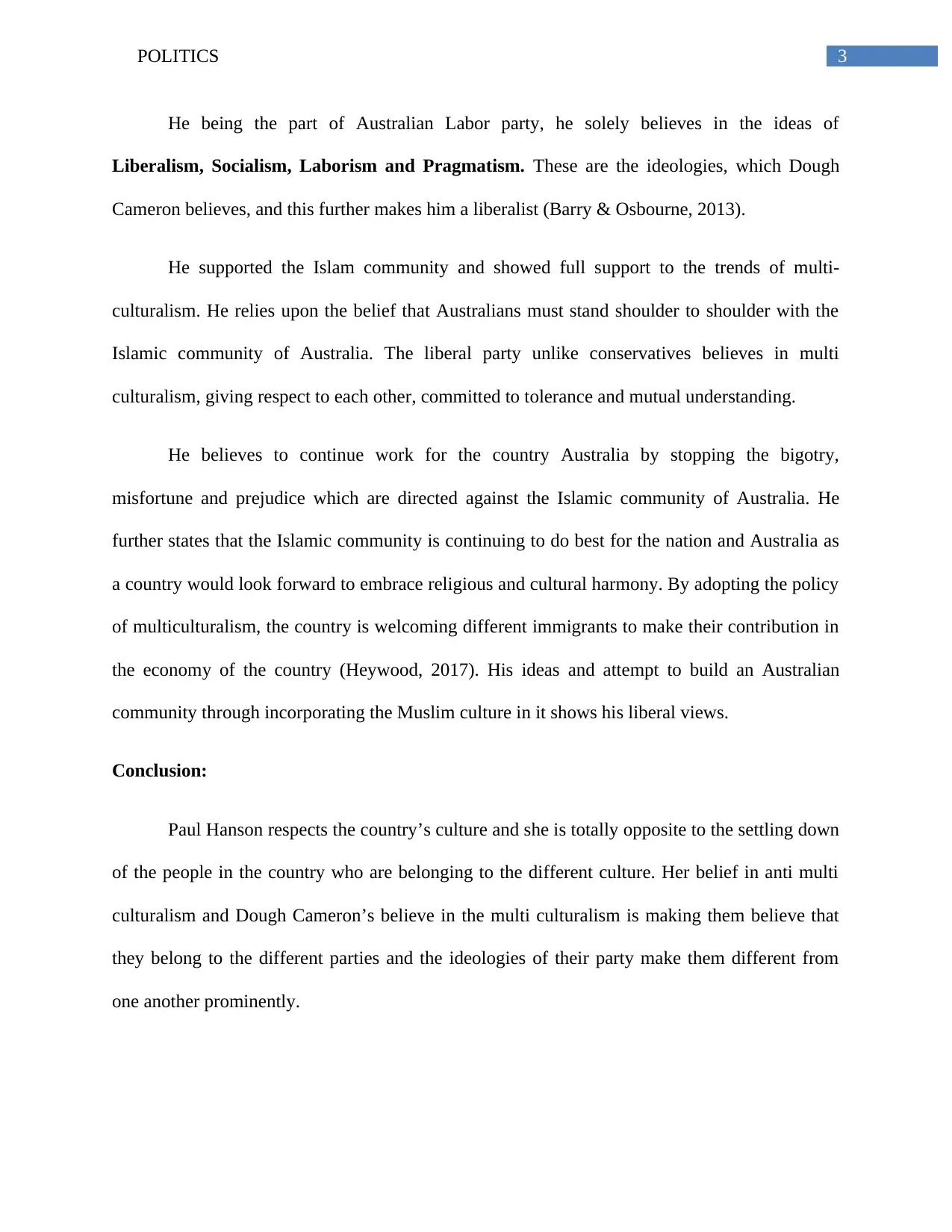
3POLITICS
He being the part of Australian Labor party, he solely believes in the ideas of
Liberalism, Socialism, Laborism and Pragmatism. These are the ideologies, which Dough
Cameron believes, and this further makes him a liberalist (Barry & Osbourne, 2013).
He supported the Islam community and showed full support to the trends of multi-
culturalism. He relies upon the belief that Australians must stand shoulder to shoulder with the
Islamic community of Australia. The liberal party unlike conservatives believes in multi
culturalism, giving respect to each other, committed to tolerance and mutual understanding.
He believes to continue work for the country Australia by stopping the bigotry,
misfortune and prejudice which are directed against the Islamic community of Australia. He
further states that the Islamic community is continuing to do best for the nation and Australia as
a country would look forward to embrace religious and cultural harmony. By adopting the policy
of multiculturalism, the country is welcoming different immigrants to make their contribution in
the economy of the country (Heywood, 2017). His ideas and attempt to build an Australian
community through incorporating the Muslim culture in it shows his liberal views.
Conclusion:
Paul Hanson respects the country’s culture and she is totally opposite to the settling down
of the people in the country who are belonging to the different culture. Her belief in anti multi
culturalism and Dough Cameron’s believe in the multi culturalism is making them believe that
they belong to the different parties and the ideologies of their party make them different from
one another prominently.
He being the part of Australian Labor party, he solely believes in the ideas of
Liberalism, Socialism, Laborism and Pragmatism. These are the ideologies, which Dough
Cameron believes, and this further makes him a liberalist (Barry & Osbourne, 2013).
He supported the Islam community and showed full support to the trends of multi-
culturalism. He relies upon the belief that Australians must stand shoulder to shoulder with the
Islamic community of Australia. The liberal party unlike conservatives believes in multi
culturalism, giving respect to each other, committed to tolerance and mutual understanding.
He believes to continue work for the country Australia by stopping the bigotry,
misfortune and prejudice which are directed against the Islamic community of Australia. He
further states that the Islamic community is continuing to do best for the nation and Australia as
a country would look forward to embrace religious and cultural harmony. By adopting the policy
of multiculturalism, the country is welcoming different immigrants to make their contribution in
the economy of the country (Heywood, 2017). His ideas and attempt to build an Australian
community through incorporating the Muslim culture in it shows his liberal views.
Conclusion:
Paul Hanson respects the country’s culture and she is totally opposite to the settling down
of the people in the country who are belonging to the different culture. Her belief in anti multi
culturalism and Dough Cameron’s believe in the multi culturalism is making them believe that
they belong to the different parties and the ideologies of their party make them different from
one another prominently.
Secure Best Marks with AI Grader
Need help grading? Try our AI Grader for instant feedback on your assignments.
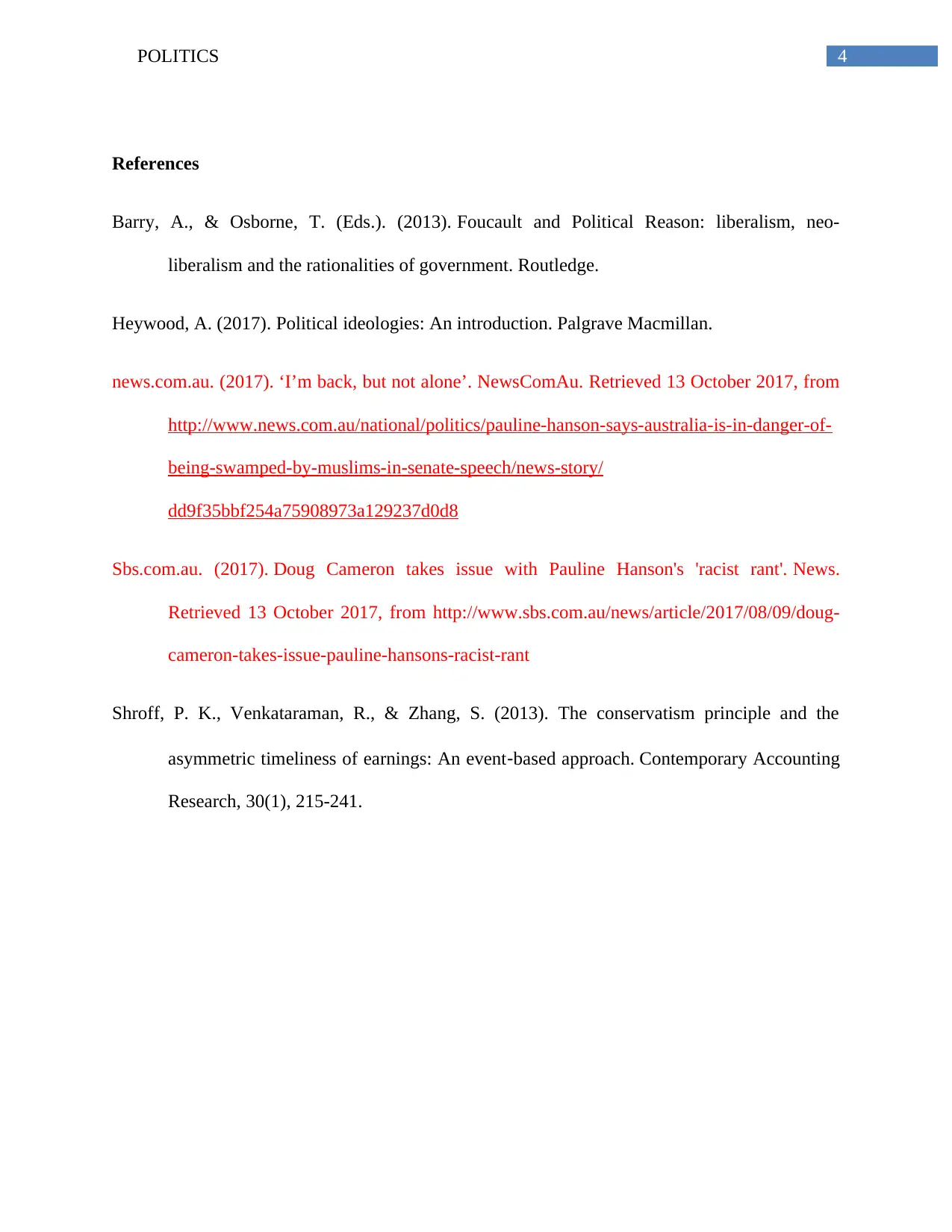
4POLITICS
References
Barry, A., & Osborne, T. (Eds.). (2013). Foucault and Political Reason: liberalism, neo-
liberalism and the rationalities of government. Routledge.
Heywood, A. (2017). Political ideologies: An introduction. Palgrave Macmillan.
news.com.au. (2017). ‘I’m back, but not alone’. NewsComAu. Retrieved 13 October 2017, from
http://www.news.com.au/national/politics/pauline-hanson-says-australia-is-in-danger-of-
being-swamped-by-muslims-in-senate-speech/news-story/
dd9f35bbf254a75908973a129237d0d8
Sbs.com.au. (2017). Doug Cameron takes issue with Pauline Hanson's 'racist rant'. News.
Retrieved 13 October 2017, from http://www.sbs.com.au/news/article/2017/08/09/doug-
cameron-takes-issue-pauline-hansons-racist-rant
Shroff, P. K., Venkataraman, R., & Zhang, S. (2013). The conservatism principle and the
asymmetric timeliness of earnings: An event‐based approach. Contemporary Accounting
Research, 30(1), 215-241.
References
Barry, A., & Osborne, T. (Eds.). (2013). Foucault and Political Reason: liberalism, neo-
liberalism and the rationalities of government. Routledge.
Heywood, A. (2017). Political ideologies: An introduction. Palgrave Macmillan.
news.com.au. (2017). ‘I’m back, but not alone’. NewsComAu. Retrieved 13 October 2017, from
http://www.news.com.au/national/politics/pauline-hanson-says-australia-is-in-danger-of-
being-swamped-by-muslims-in-senate-speech/news-story/
dd9f35bbf254a75908973a129237d0d8
Sbs.com.au. (2017). Doug Cameron takes issue with Pauline Hanson's 'racist rant'. News.
Retrieved 13 October 2017, from http://www.sbs.com.au/news/article/2017/08/09/doug-
cameron-takes-issue-pauline-hansons-racist-rant
Shroff, P. K., Venkataraman, R., & Zhang, S. (2013). The conservatism principle and the
asymmetric timeliness of earnings: An event‐based approach. Contemporary Accounting
Research, 30(1), 215-241.
1 out of 5
Your All-in-One AI-Powered Toolkit for Academic Success.
+13062052269
info@desklib.com
Available 24*7 on WhatsApp / Email
![[object Object]](/_next/static/media/star-bottom.7253800d.svg)
Unlock your academic potential
© 2024 | Zucol Services PVT LTD | All rights reserved.